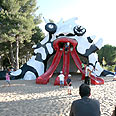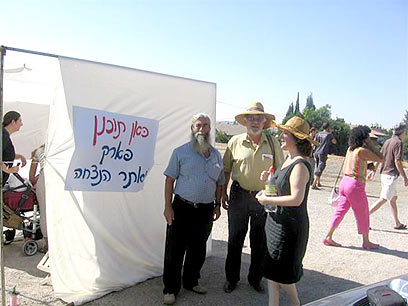
'Kiryat Yovel may soon become Bnei Brak'
Secular Jerusalem residents fear they may be losing their pluralistic neighborhood to haredim
"This neighborhood should be a pluralistic neighborhood with secular and national religious residents. In one month, the haredim have managed to cause so much tension in this city, something we haven't seen in years… If we lose Kiryat Yovel, we'll lose the entire city," says Michael Ben-Avi, director-general of the communal administration.
The past few weeks have given the impression that Kiryat Yovel's haredi residents are seeking to strengthen their hold on the secular neighborhood.
After failing to obtain the land reserves of the Boyer school, the new neighbors on the block asked to install eruv posts (physical or symbolical fences around Jewish areas allowing children, parcels to be carried within its confines on Shabbat) in the neighborhood.
Simultaneously, the Jerusalem Municipality decided to use a field originally designated for an arts center for a new haredi kindergarten.
"What can we do? You have one child and a dog and we have families with 12 children," the residents of Warburg Street were told after expressing their concern over the nature of their neighborhood, with an ultra-Orthodox kindergarten being built under their window.
They learned of the new kindergarten accidentally, when one day a bulldozer began flattening the ground and its driver refused to present permits.
Now the quiet neighborhood is facing an earthquake. Will Kiryat Yovel maintain its pluralistic nature or turn into a haredi neighborhood, as happened not so long ago in Ramot, Bait Vagan, Ramat Eshkol and Neve Yaakov?
'We moved because of the price'
There are 17,500 people living in Kiryat Yovel today, including 350 ultra-Orthodox families, 200 of whom only arrived in the neighborhood this year. This has caused a public debate on issues which have been penetrating the neighborhood below the surface for three years now.
It took Kiryat Yovel years to escape the image of a slum and turn into a preferred target by young families. But then the harmony between its secular and national religious ceremony was put at risk.
"There are 350 haredi families living in Kiryat Yovel today. When my wife and I moved to the neighborhood two years ago from our parents' home in Bait Vagan, there were only 100 haredi families were living here," says S., a member of the neighborhood's ultra-Orthodox committee which cares for the sector's needs.
"There is no doubt that young couples have discovered the neighborhood's potential," says Moshe Montag, head of the Jerusalem charity committee. "People whose parents live in Bait Vagan, Har Nof or Givat Shaul, instead of going to the suburbs many of them have weighed their options and preferred to stay in an apartment in Jerusalem, even if it's small."
'Not an anti-religious battle'
The change is also being felt in the "monster park," one of the symbols of the neighborhood, which recently celebrated its 35th birthday. The monster slide, which "raised" many generations of infants, was also a favored playground for Shai Gidoni, a fifth grader, but her younger siblings have already found other places to play in.
"We stopped going to the monster because the haredim took over the place," says Shai, who alerted the residents a few weeks ago when she noticed a bulldozer preparing the area for an ultra-Orthodox kindergarten.

Seculars' protest tent in Kiryat Yovel (Photo: Aner Green)
"I was born and raised here, this was my first home, and I have been at this pizza place for 20 years now," says Kobi Petel, who owns the local pizzeria, "Pizza Pushka."
"There has recently been a wave of haredim asking me for a strict kashrut certificate. Most accept my explanation that the permit was received from the Jerusalem Rabbinate, that the cheese are from Tnuva and that the flour is sifted, but one out of five does not settle for this explanation and leaves without buying anything.
"I recently replaced the vegetables on the pizza with strictly kosher ones, and my expenses have grown. We always thought of making the place strictly kosher, but now this has become relevant. I want the one out of five that leaves to stay and buy."
"This is not a battle of seculars against haredim," a representative of the residents of Warburg Street stressed, in an attempt to explain the events of the past few weeks.
"We have excellent neighborly relations with all residents, the neighborhood's rabbi is a highly esteemed person who treats skullcap wearers and those travelling on Shabbat equally, but there is a feeling of guiding hand coming from the municipality, seeking to cause tension," says Danny Unger, who grew up in the neighborhood and recently returned to live there with his wife and their five children.
About two weeks ago, the residents woke up to the sight of a tractor working in the empty field opposite their houses, where an arts center and a memorial for the neighborhood's fallen residents was slated to be built.
At first they were filled with hope that the plan's implementation was moved up, but when they asked the bulldozer driver what he was doing, he refused to answer. They soon discovered that the works were initiated by the Jerusalem Municipality, which plans to set up caravans for ultra-Orthodox kindergartens.
"Our battle is not anti-religious but against the municipality for doing things which are against the law," says Eti Gidoni, who has been living in the neighborhood for 22 years.
Yifat Reuven contributed to this report










